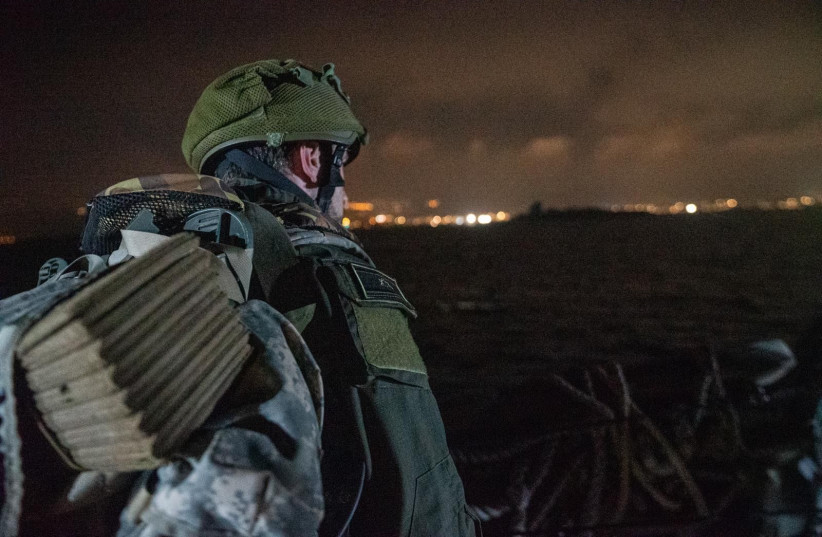The South African government on Monday issued a warning to its citizens and permanent residents against participating in the ongoing war in Gaza by joining the IDF. This announcement comes amidst reports to the government of South Africans considering or already enlisting in the IDF.
The government's statement aimed to alert South African citizens about the legal and international implications of joining the IDF or any foreign armed forces involved in conflicts.
The government expressed "grave concerns" over such actions, emphasizing that they could lead to "violations of international law and the commission of further international crimes, thus making them liable for prosecution in South Africa."
According to the government's statement, under the Regulation of the Foreign Military Assitance Act of 1988, an act "to regulate the rendering of foreign military assistance by South African juristic persons, citizens, persons permanently resident with the Republic and foreign citizens rendering such assistance from within the borders of the Republic, and to provide for matters connected therewith," individuals seeking to render foreign military assistance in Israel are required to apply for approval from the National Conventional Arms Control Committee (NCACC).
"I would like to send a message to every Jew still in South Africa: get out now while you still can. Come to Israel where you can be with your family and our people. Leave South Africa,"
IDF Lone Soldier from South Africa

The NCACC, after thorough evaluation, advises the Defense Minister and Military Veterans to either grant or refuse the application. Joining the IDF or any foreign military without NCACC's authorization is deemed unlawful, with possible legal repercussions, in South Africa.
The statement continued to explain that the South African Citizenship Act of 1995 stipulates that naturalized South African citizens will lose their citizenship if they engage in military activities under the flag of a country in a war not supported by the Republic of South Africa.
South Africa-Israel diplomatic ties
South African President Cyril Ramaphosa and senior foreign ministry officials have been vocally critical of Israel's leadership for many years, especially now during its war against Hamas, calling on the International Criminal Court to investigate them for potential war crimes.
South Africa is one of the only countries in the world to recognize Hamas as a representative of the Palestinian people.
In mid-November, South African lawmakers voted in favor of closing down the Israeli embassy in Pretoria and suspending all diplomatic relations until a ceasefire is agreed in its war with Hamas.
When speaking with a current lone soldier from Johannesburg, South Africa, who is fighting in the Israel-Hamas war in the Gaza Strip, he told The Jerusalem Post, "As a proud South African, and a proud Jew, I am horrified by the decision of the government. It is forcing me to choose between being Israeli or South African, as opposed to both."
"I would like to send a message to every Jew still in South Africa: get out now while you still can. Come to Israel where you can be with your family and our people. Leave South Africa," he said.
"As a South African, I'm very scared to even go back and visit my family," a current Bat Sheirut from South Africa told the Post whose boyfriend and cousin, also South African, are currently an IDF soldier fighting in the war. "It's scary to think that my boyfriend and his brother could be sued or prosecuted just for being a Jew in Israel, serving their country."
"It's a very surreal feeling," she explains. "Imagine leaving your country where you originate from, to move to a country where it's safer for you to be a Jew, just to be told you can't go back your country, just because you're a Jew."
The response of the South African Jewish community
In response to this article, Wendy Kahn, the national director of the South African Jewish Board of Deputies (SAJBD), described her experience of dealing with the complex situation regarding South African Jewry.
"In South Africa, the war has resulted in extremely hostile and biased rhetoric from the government. The South African Jewish Board of Deputies has, since Hamas massacre of innocent citizens on 7 October, challenged our government on their silence in condemning Hamas. We have done this in meetings, by placing full-page newspaper adverts in the media, and through protests," explained Kahn.
When meeting with South African President Cyril Ramaphosa and Minister of International Relations Naledi Pandor, Khan depicted that these leaders made it clear to her that they place all blame on Israel in regard to the war and refuse to engage with Israel's leaders.
"We need to recognize much of the rhetoric for what it is: political posturing in the lead-up to the SA elections next year. Much of what is being seen should be viewed as noise and political grandstanding. Those in the know understand that South Africa’s reporting of Israel to the ICC is absurd," Kahn continued.
Khan's response ends on a positive note, however, as she describes the support that has been felt by those who are not willing to buy into the government's rhetoric.
"We have experienced an overwhelming sense of support from many in our country who see through the hate. The large Christian groups, with millions of followers, have held solidarity events and have made it clear that they support Israel’s right to exist and her right to defend her citizens. In addition to that, several of the opposition parties have also stood by our community during these difficult times.
"Many Israeli visitors have been welcomed in our country and have not experienced any difficulties."
"At times of heightened emotions such as these, it is critical to differentiate what is noise and political posturing and what is real," Kahn concluded.
